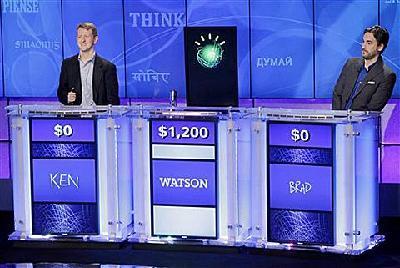
This is the VOA Special English Technology Report. An IBM super computer named Watson has won the latest battle of man versus machine.
Watson won the first ever "Jeopardy!" quiz show competition starring a computer as a player. The show was broadcast on American television February 16th. The super computer defeated former "Jeopardy!" champions Ken Jennings and Brad Rutter during the three-day competition. The two men had been the show's most successful players until then.
The IBM computer proved to be more knowledgeable in every category, including the arts, popular culture and science. The human contestants spoke about their loss after the show.
KEN JENNINGS/BRAD RUTTER: "I think that we both got a taste of what it might have been like to play against us."
Roger Norton is dean of the School of Computer Science and Mathematics at Marist College in Poughkeepsie, New York. The school held a Watson watch party on the final day of the "Jeopardy!" competition. They compared it to a Super Bowl for the information technology industry. Roger Norton says everyone was amazed by Watson's performance.
ROGER NORTON: "It was very impressive in a number of ways. One is its ability to understand natural language."
In "Jeopardy!" players are given information in the form of an answer. They must give an answer in the form of a question. Roger Norton says the very nature of the game makes Watson's performance even more extraordinary.
ROGER NORTON: "The ambiguity that's in those answers is very, very difficult for humans to understand, never mind a computer to understand. And then to be able to take that, try to understand it, then go off and search its vast amount of data that it has and do the appropriate analytics and come up with not only an answer but also a confidence level associated with that answer -- very, very impressive."
Watson was given the answer clues by electronic texts. It then searched through some 15 trillion bytes of information stored in its database. That is equal to about 200 million pages of text. The machine is able to perform up to 80 trillion operations per second.
And its ability to understand language is more advanced than any other computer ever developed. This opens the door to a whole new world of computer applications. From business and investment, to medicine and healthcare, the possibilities are endless.
Watson is now going to medical school. It is part of an agreement among IBM, Columbia University Medical Center in New York City and the University of Maryland's School of Medicine. The researchers will help IBM identify the best way that Watson can be used to help the healthcare industry.
And that's the VOA Special English Technology Report, written by June Simms. You can find transcripts, MP3s and podcasts of our reports at voaspecialenglish.com. I'm Steve Ember.
Man ties machine in Jeopardy! showdown
Looking to robots and other technology to improve health care
(來源:VOA 編輯:崔旭燕)
